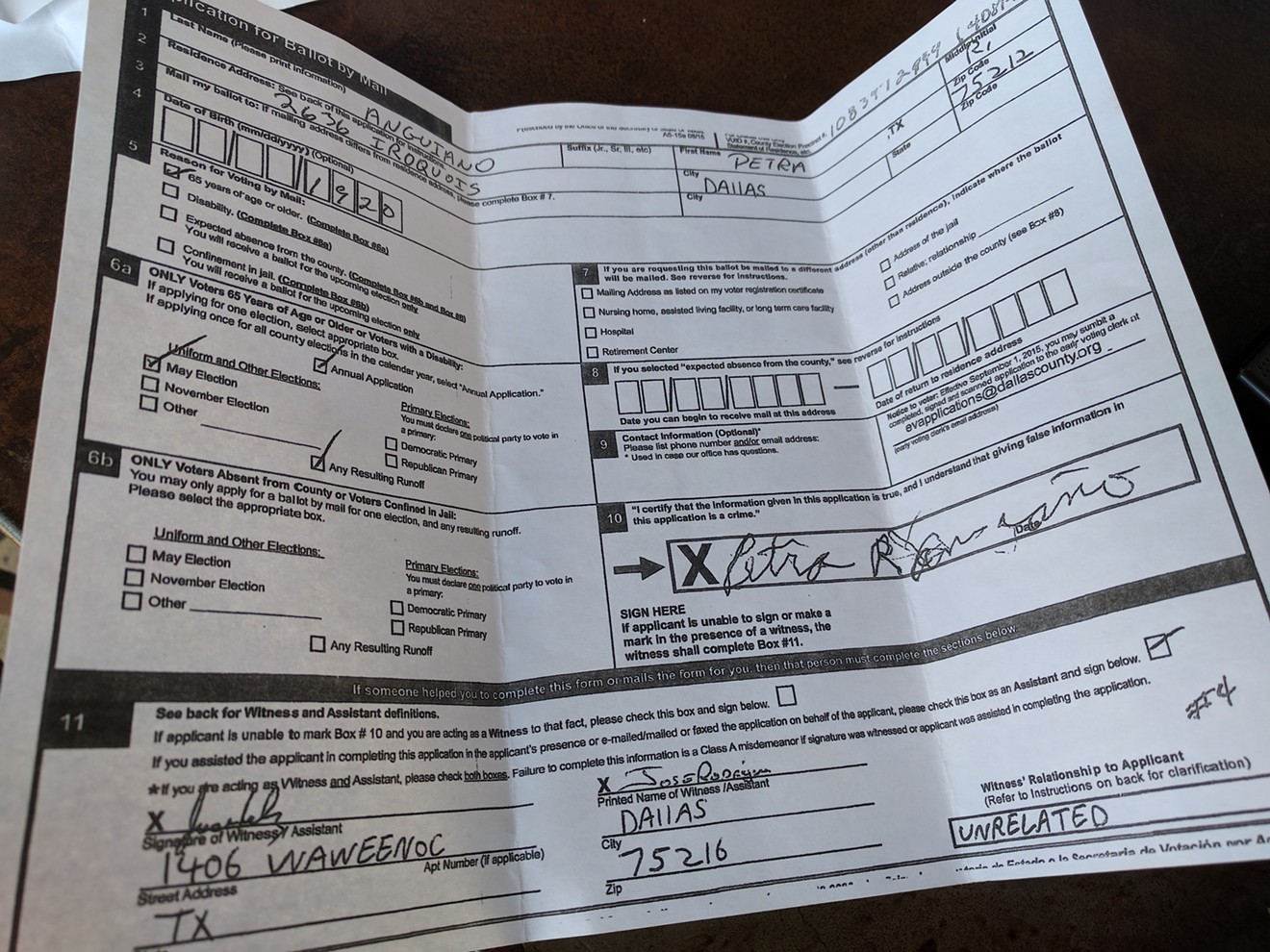On Saturday afternoon, a couple of hours before the first results would be released in Dallas' three City Council runoffs, the specter that had hung over Dallas municipal elections all spring reared its ugly head again.
Dallas County Elections Administrator Toni Pippins-Poole announced that the vast majority of mail-in ballots cast in the runoff elections would be sequestered on election night, potentially putting the results of the three pivotal council contests in limbo until the votes could be verified.
The Dallas County District Attorney's Office filed paperwork Thursday to hold back any ballot with which the person voting received assistance until that ballot could be more closely examined. That day, Dallas County Judge Carl Ginsberg granted Assistant District Attorney Andy Chatham's motion to hold the ballots back for further inspection out of an abundance of caution stemming from Chatham's ongoing investigation into potential voter fraud in West Dallas during the first-round council election in May.
Ginsberg's decision didn't end up creating that much suspense. By the time Dallas went to bed Saturday night, it was clear that all three challengers, Kevin Felder, former City Council member Tennell Atkins and Omar Narvaez in West Dallas' District 6 had picked off their incumbent opponents.
Om Sunday night, county elections officials published the final totals in the runoffs. As Dallas prepares to seat its new council, let's take a take a look at the state of the investigation by answering a few key questions.
1. Did mail-in vote fraud affect the outcome of any Dallas City Council election?
No, it didn't. Despite the razor-thin margins that often occur in Dallas' lowest turnout districts, the candidate who won the in-person balloting during the final round of voting won each of the 14 seats on the Dallas City Council. In districts 6, 7 and 8, the candidates who finished first and second during in-person voting in the first round all made it to the runoff.
2. How many ballots did Dallas County throw out during the runoffs?
Zero, according to Dallas City Council member Philip Kingston, who says that the city will certify the runoff totals Wednesday. Elections officials looked at each of the 698 sequestered runoff ballots Sunday and added all of them to the official totals.
3. How did the mail-in totals in District 6 change between the first round of voting, during which the fraud allegedly occurred, and the runoff, which occurred after prosecutors issued the first warrant in the case?
During the first round of balloting, 476 people voted for either Alonzo or Narvaez by mail, out 568 total mail-in ballots cast. During the runoff, 436 people cast ballots by mail. Alonzo received 55 percent of mail-in ballots cast in the first round and 56 percent of mail-in ballots cast in the second round. Narvaez went from 28 percent to 44 percent. Even accounting for the potential ramifications of 98 ballots thrown out for fraud concerns in the first round, the results are similar, with Narvaez picking up the majority of the votes from supporters of also-ran candidates who'd already decided that they didn't want to give Alonzo a fourth term.
4. What about that warrant?
Miguel Hernandez, the man named on the only warrant issued in the voter fraud investigation, has yet to be arrested. Prosecutors believe they've tied Hernandez to at least one fraudulent ballot during the first round of voting, thanks to a witness who says she gave Hernandez a blank ballot that later showed up filled in at Dallas County election headquarters. Hernandez is charged with Illegal voting, a third-degree felony punishable by two to 10 years in prison, rather than illegally gathering mail-in ballots, a misdemeanor offense.
5. What happens next?
While Chatham and the District Attorney's Office aren't commenting on the ongoing investigation, Texas Gov. Greg Abbott said creating stiffer penalties for mail-in vote fraud is one of his 20 priorities for the special legislative session he's called for July 18. He pointed to the ongoing investigation in Dallas as evidence that stiffer penalties are necessary to preserve the integrity of Texas' elections.
[
{
"name": "Air - MediumRectangle - Inline Content - Mobile Display Size",
"component": "18855504",
"insertPoint": "2",
"requiredCountToDisplay": "2"
},{
"name": "Editor Picks",
"component": "17105533",
"insertPoint": "4",
"requiredCountToDisplay": "1"
},{
"name": "Inline Links",
"component": "18349797",
"insertPoint": "8th",
"startingPoint": 8,
"requiredCountToDisplay": "7",
"maxInsertions": 25
},{
"name": "Air - MediumRectangle - Combo - Inline Content",
"component": "17105532",
"insertPoint": "8th",
"startingPoint": 8,
"requiredCountToDisplay": "7",
"maxInsertions": 25
},{
"name": "Inline Links",
"component": "18349797",
"insertPoint": "8th",
"startingPoint": 12,
"requiredCountToDisplay": "11",
"maxInsertions": 25
},{
"name": "Air - Leaderboard Tower - Combo - Inline Content",
"component": "17105535",
"insertPoint": "8th",
"startingPoint": 12,
"requiredCountToDisplay": "11",
"maxInsertions": 25
}
]












